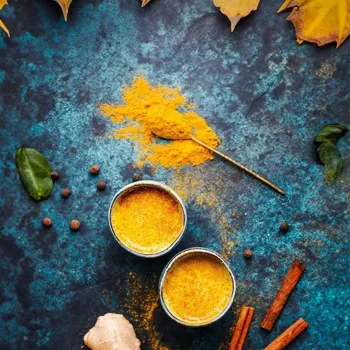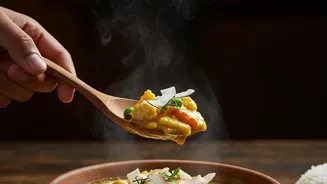Dive into the intricate connection between food and culture in India. Uncover 7 captivating insights intertwining tradition and taste
India, a land of vibrant colours, diverse traditions, and a rich history,
presents a fascinating interplay between food and culture. Food here is not just sustenance; it's a celebration, a ritual, and a powerful expression of identity. Let's dive into seven insightful glimpses of this deep connection:
Regional Diversity on a Plate
India's vast geography and varied climate zones have given rise to distinct regional cuisines. Each region boasts unique ingredients, cooking styles, and traditional dishes.
From the simple yet flavorful Gujarati thali focusing on sweet and savory combinations to the hearty, spice-laden dishes of Rajasthan, the variations are endless. This diversity reflects the unique agricultural practices, cultural practices, and historical influences shaping each region.
Take for instance, the abundance of coconut in South Indian cuisine; owing to the plentiful harvests along the coastal regions. This clearly showcases how geography greatly dictates the food habits of that location.
Festivals and Feasts
Festivals in India are incomplete without special food preparations. Each festival is associated with specific dishes that hold symbolic and cultural significance. Diwali, the festival of lights, is synonymous with mithai (sweets) of all kinds, signifying prosperity and good fortune.
Holi, the festival of colours, is celebrated with gujiya (sweet dumplings) and thandai (a milk-based drink), to celebrate the vibrancy and joy of the occasion.
Likewise, Pongal in Tamil Nadu is incomplete without the sweet Pongal dish prepared with rice, jaggery, and milk, offered as a thanks giving to the sun god. Food for festivals is more than just for eating; it's a fundamental part of the celebrations.
Food as a Symbol of Community and Hospitality
Sharing food is deeply ingrained in Indian culture and serves as a way to connect with others and show hospitality. Whether it's Langar at the Gurudwara or a traditional family meal, food brings people together.
The concept of "Atithi Devo Bhava" (the guest is equivalent to God) emphasizes the importance of feeding and taking care of visitors, showcasing generosity and respect. In many Indian homes, the first portion of any cooked meal is offered to God, before partaking.
This signifies a sense of gratitude to the divine being. This sharing extends beyond just personal homes, influencing community and traditions.
Ayurveda and Holistic Eating
The ancient Indian system of medicine, Ayurveda, emphasizes the importance of food in maintaining physical and mental well-being. Ayurvedic principles guide dietary choices based on an individual's doshas (body constitutions) and promote the consumption of fresh, seasonal, and wholesome foods.
The concept of "Sattvic" food, which emphasizes purity and balance, is often followed to promote mental clarity and spiritual growth. Ayurveda considers various food types such as fruits, nuts, cereals and so forth for specific conditions that are needed to be addressed.
This approach is highly personalised to each body.
Spices and Their Cultural Significance
Spices are the heart and soul of Indian cuisine, each with its own unique flavour profile and medicinal properties. Turmeric, known for its anti-inflammatory benefits, holds a special place in rituals and ceremonies.
Cumin, coriander, and cardamom are just a few examples of the spices that add depth and complexity to Indian dishes. The significance of spices extends beyond their culinary use and is often linked to cultural practices and beliefs.
It’s commonly seen in Indian household to use spices, not only to enhance the taste of foods, but as the first thing to address bodily ailments.
Traditions, Rituals, and Food
Food plays a central role in various rituals and ceremonies across India. From new year festivities to wedding celebrations, specific dishes are prepared and consumed as part of the festivities. The distribution of prasad (blessed food) in temples also holds a significant meaning.
In essence, it's more than just distribution; it is to share the blessings of God in the form of sustenance. These time honored traditions and eating custom are often passed down through generations.
The food is not just about taste or nutrition, it is intertwined with stories, values, and shared experiences that bind people together.
The Evolution of Food Culture
Indian food culture is constantly evolving, adapting to modern influences while maintaining its core values. While traditional cooking methods and recipes are still cherished, there is also a growing interest in fusion cuisine and innovative culinary techniques.

With the rise of globalization and diaspora, Indian cuisine has spread across the world adapting, enriching other cultures. The appreciation and understanding of the culture of Indian food has grown internationally.
Despite the modern influences, the underlying cultural significance of food continues to shape and enrich the Indian taste.
In Conclusion:
The interplay between food and culture in India is a multifaceted and captivating exploration. It offers a glimpse into the country's rich heritage, regional diversity, and deep-rooted traditions.
Whether it's a simple everyday meal or an elaborate festive banquet, food in India is always more than just nourishment; it's a symbol of connection, celebration, and cultural identity.
Delving deeper into the realm of Indian food will uncover a vast tapestry of flavors, stories, enriching our understanding of this incredible land.
AI Generated Content. Glance/InMobi shall have no liability for the content












